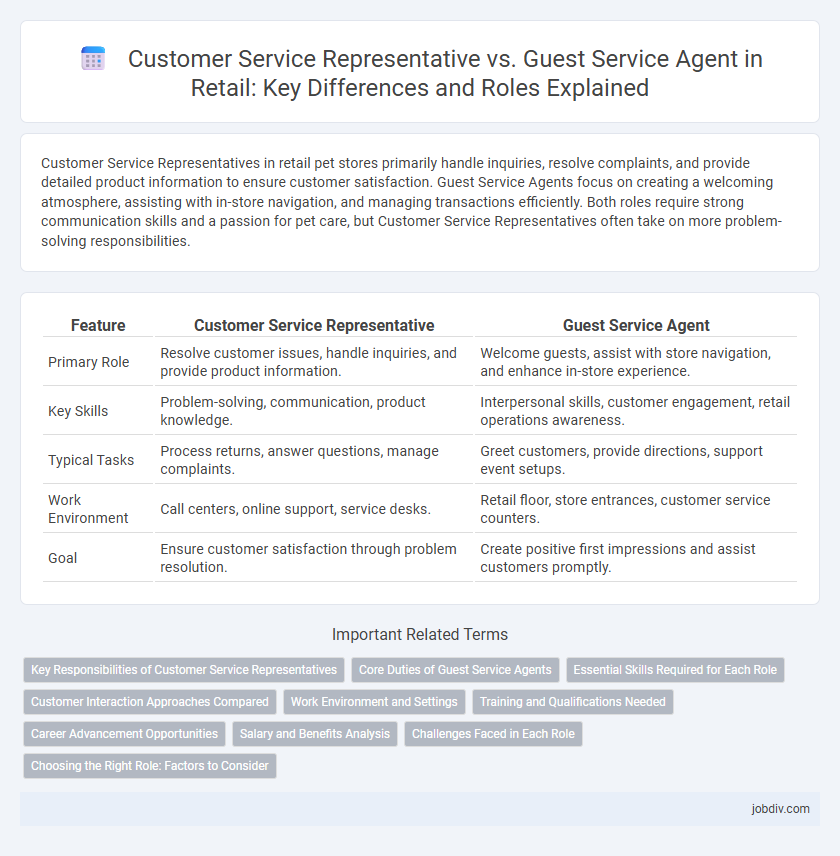Customer Service Representatives in retail pet stores primarily handle inquiries, resolve complaints, and provide detailed product information to ensure customer satisfaction. Guest Service Agents focus on creating a welcoming atmosphere, assisting with in-store navigation, and managing transactions efficiently. Both roles require strong communication skills and a passion for pet care, but Customer Service Representatives often take on more problem-solving responsibilities.
Table of Comparison
| Feature | Customer Service Representative | Guest Service Agent |
|---|---|---|
| Primary Role | Resolve customer issues, handle inquiries, and provide product information. | Welcome guests, assist with store navigation, and enhance in-store experience. |
| Key Skills | Problem-solving, communication, product knowledge. | Interpersonal skills, customer engagement, retail operations awareness. |
| Typical Tasks | Process returns, answer questions, manage complaints. | Greet customers, provide directions, support event setups. |
| Work Environment | Call centers, online support, service desks. | Retail floor, store entrances, customer service counters. |
| Goal | Ensure customer satisfaction through problem resolution. | Create positive first impressions and assist customers promptly. |
Key Responsibilities of Customer Service Representatives
Customer Service Representatives in retail primarily handle customer inquiries, resolve complaints, and process orders to ensure a seamless shopping experience. They manage product information, facilitate returns and exchanges, and maintain accurate customer records to support efficient service delivery. These representatives play a crucial role in boosting customer satisfaction by providing timely assistance and personalized support throughout the purchasing journey.
Core Duties of Guest Service Agents
Guest Service Agents primarily focus on enhancing the in-store customer experience by assisting guests with product inquiries, handling returns, and resolving complaints promptly to ensure satisfaction. Their core duties include managing check-ins and check-outs, processing transactions accurately, and providing information regarding store policies and promotions. Unlike Customer Service Representatives, who may handle broader customer interactions via phone or online support, Guest Service Agents work face-to-face to create a welcoming and efficient retail environment.
Essential Skills Required for Each Role
Customer Service Representatives in retail require strong communication, problem-solving abilities, and product knowledge to effectively assist customers and resolve inquiries. Guest Service Agents must excel in hospitality skills, empathy, and conflict resolution to ensure a positive shopping experience and manage customer interactions smoothly. Both roles demand proficiency in multitasking, patience, and a customer-focused attitude to drive satisfaction and loyalty.
Customer Interaction Approaches Compared
Customer Service Representatives typically handle a broad range of inquiries, offering detailed product information and resolving complex issues through direct communication channels such as phone and email. Guest Service Agents focus on creating personalized, face-to-face experiences in retail environments, addressing immediate customer needs with empathy and quick problem-solving. Both roles emphasize customer satisfaction but differ in interaction style, with Representatives managing multi-channel support and Agents delivering hands-on service.
Work Environment and Settings
Customer Service Representatives in retail typically operate in call centers or office environments, handling customer inquiries via phone, email, or chat. Guest Service Agents often work on-site at stores, malls, or hospitality venues, directly interacting with customers to provide personalized assistance. The work environment of Customer Service Representatives emphasizes remote communication, while Guest Service Agents focus on face-to-face customer engagement.
Training and Qualifications Needed
Customer Service Representatives in retail typically require strong communication skills and basic problem-solving abilities, often with a high school diploma or equivalent as a minimum qualification. Guest Service Agents usually need additional training in hospitality and conflict resolution, reflecting the higher emphasis on personalized customer interactions and handling complex situations. Both roles benefit from ongoing customer service training programs to enhance product knowledge and improve engagement strategies.
Career Advancement Opportunities
Customer Service Representatives in retail often have broader career advancement opportunities, moving into supervisory or managerial roles due to their experience in handling diverse customer interactions and resolving complex issues. Guest Service Agents typically focus on frontline support, which can limit upward mobility unless they expand their skills into sales or specialized service areas. Retail companies value cross-trained employees, so gaining expertise in both roles can accelerate career progression and open paths to leadership positions.
Salary and Benefits Analysis
Customer Service Representatives in retail typically earn an average salary of $32,000 to $40,000 annually, while Guest Service Agents may receive slightly higher compensation, ranging from $35,000 to $45,000, depending on the employer and location. Benefits for Customer Service Representatives often include standard health insurance, paid time off, and employee discounts, whereas Guest Service Agents might also access performance bonuses and flexible scheduling options. Salary progression and comprehensive benefits packages tend to be more competitive for Guest Service Agents due to their direct interaction with customers and higher responsibility levels.
Challenges Faced in Each Role
Customer Service Representatives often face challenges such as handling high volumes of customer inquiries across multiple channels and resolving complex issues efficiently to maintain satisfaction. Guest Service Agents encounter difficulties managing immediate, face-to-face interactions in fast-paced retail environments, requiring quick problem-solving and maintaining a positive guest experience under pressure. Both roles demand strong communication skills, but differ in the nature of challenges driven by interaction mode and customer expectations.
Choosing the Right Role: Factors to Consider
Choosing between a Customer Service Representative and a Guest Service Agent depends on the specific retail environment and customer interaction level required. Customer Service Representatives often handle broader communication channels such as phone, email, and online chats, focusing on problem resolution and product inquiries. Guest Service Agents typically provide face-to-face assistance, emphasizing personalized service and immediate support in physical store locations.
Customer Service Representative vs Guest Service Agent Infographic

 jobdiv.com
jobdiv.com